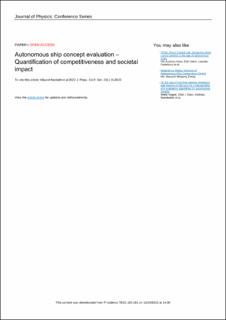Autonomous ship concept evaluation – Quantification of competitiveness and societal impact
Peer reviewed, Journal article
Published version
Date
2022Metadata
Show full item recordCollections
- Publikasjoner fra CRIStin - SINTEF Ocean [1387]
- SINTEF Ocean [1461]
Original version
Journal of Physics: Conference Series (JPCS). 2022, 2311, 1-14. 10.1088/1742-6596/2311/1/012020Abstract
The prospect of large-scale international adoption of autonomous ships has led to expectations of reduced costs and emissions for waterborne transport of goods. This is commonly attributed to the possibility of removing manning from the ship, which enables more efficient ship designs and reduced operational costs. So why have we not seen a multitude of autonomous ship building projects? There are several reasons for this, including immature technology and regulations. However, there is another reason which has received less attention; the lack of quantifiable evidence for the benefits arising from investing in autonomous ships. There are some case studies on the impact of autonomy on transport cost, but there is no established method for evaluating the effects of an investment in autonomous ships. This paper will present Key Performance Indicators (KPIs) developed to enable such quantification. Furthermore, the developed KPIs are chosen not only to enable quantification of benefits but also to be calculable based on data which it is reasonable to assume that are available or obtainable at a concept stage.

